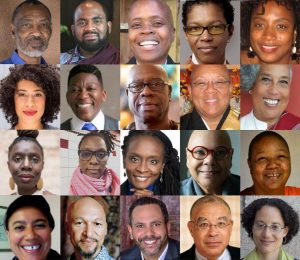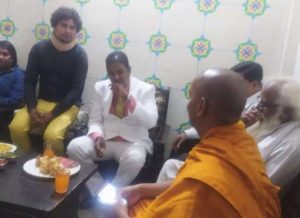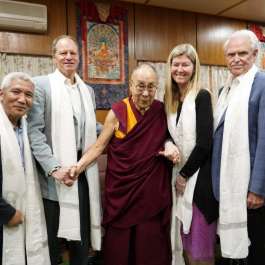The Text of Amitabha’s 12th and the 13th vows
Of the 48 Vows, the 12th and the 13th are two of the Five Real Vows of Amitabha Buddha. The 12th Vow, known as the Vow of Infinite Light, reads as follows:
If, when I attain Buddhahood, my light should be limited, unable to illuminate at least a hundred thousand kotis of nayutas of Buddha-lands, may I not attain perfect Enlightenment.
The 13th Vow, known as the Vow of Infinite Life, states as follows:
If, when I attain Buddhahood, my life-span should be limited, even to the extent of a hundred thousand kotis of nayutas of kalpas, may I not attain perfect Enlightenment.
Two names: Amitabha and Amitayus
According to the Amitabha Sutra, two names are given to the Buddha in the Land of Bliss. One is Amitabha, and the other is Amitayus. The sutra says:
“Shariputra, the Buddha’s light shines boundlessly and without hindrance over all the worlds of the ten quarters. It is for this reason that he is called Amida (Amitabha).
“Again, Shariputra, the lives of the Buddha and the people of his land last for immeasurable, unlimited and incalculable kalpas. It is for this reason that the Buddha is called Amida (Amitayus).”
From this, it is clear that the 12th and 13th Vows are related to Amitabha Buddha himself. However, if we consider the matter carefully, we will see that these two vows were also made by Dharmakara Bodhisattva for the sake of delivering sentient beings and facilitating their rebirth in his Pure Land.
These two vows are made subsequent to the 11th Vow
These two vows are made right after the 11th Vow, wherein Dharmakara Bodhisattva promises all aspirants that they will become buddha-like beings on rebirth in the Land of Bliss. But how can he keep his promise if he has no infinite life and infinite light?
On rebirth, all beings will have the same lifespan and the same body (in the form of light) as Amitabha Buddha. This is no different than inhabitants of the Land of Bliss having the same supernatural powers as Amitabha, as promised in the first 11 vows.
Master Quyi said: “For those who hold fast to the Name, their body light and life are the same as the Buddha’s.” Master Yinguang also noted: “If an ordinary being can be reborn in the West, then his light and life will be immeasurable and boundless, the same as the Buddha’s.”
Thus, it is more appropriate to interpret these two important vows from the point of view of “benefitting oneself by benefitting others,” as expressed in the Bodhisattva teachings.
Perfection in self-benefitting and benefitting others
Light represents the virtue of wisdom and life represents the virtue of compassion. Both are fundamental elements on which all Buddhist teachings are based. With respect to bodhisattva teachings, infinite light and infinite life are the two main characteristics of a Reward Body (sambhogakaya) Buddha.
In his past cultivation, Amitabha Buddha perfectly accomplished both wisdom and compassion. Infinite light signifies Amitabha’s form as wisdom issuing from his perfect enlightenment, and infinite life is a virtue resulting from his eternal body which, like nirvana, is unconditioned and unchanging.
From the above, we can understand the complete fullness of Amitabha’s self-benefitting. But he is no less accomplished in benefitting others. Amitabha’s light permeates all the worlds in the ten directions through the vastness of space, while his life extends to the three periods of time in the past, present, and future.
Thus, Amitabha Buddha can reach sentient beings in all worlds in the ten directions without any obstruction, and instantly respond to those who recite his Name at any time and in any place. He can embrace and protect them with his light and likewise receive them to be reborn in the Land of Bliss at the end of their lives.
How does Amitabha Buddha embrace, deliver, and receive Amitabha-reciters
In the Contemplation Sutra, Shakyamuni Buddha explains how Amitabha Buddha uses his body in the form of unhindered light to embrace, deliver, and receive all exclusive Amitabha-reciters of the ten directions to be reborn in his buddha-land. He says in the Ninth Contemplation:
“The Buddha Amitayus possesses eighty-four thousand physical characteristics, each having eighty-four thousand secondary marks of excellence. Each secondary mark emits eighty-four thousand rays of light; each light shines universally upon the lands of the ten directions, embracing, and not forsaking, those who are mindful of the Buddha.
It is impossible to describe in detail these rays of light, physical characteristics and marks, transformed Buddhas, and so forth. But you can see them clearly with your mind’s eye through contemplation [name-recitation].”
Moreover, the Infinite Life Sutra tells us that Amitabha’s light is the greatest among all buddhas. To emphasize this, the sutra reveals that he has 12 other names related to light, namely: the Buddha of Infinite Light, the Buddha of Boundless Light, the Buddha of Unhindered Light, the Buddha of Incomparable Light, the Buddha of the Light of the King of Flame, the Buddha of Pure Light, the Buddha of the Light of Joy, the Buddha of Light of Wisdom, the Buddha of Unceasing Light, the Buddha of Inconceivable Light, the Buddha of Ineffable Light, and the Buddha of Light Outshining the Sun and Moon.
Each of these names, revealing different kinds of light, has its own natural capacity to benefit and deliver sentient beings, enabling them to be reborn and become buddha-like beings in the Land of Bliss.
Amitabha’s Name is Amitabha Buddha himself in the form of light. Thus, his Name is the Dharma, the teaching of deliverance in and of itself. Whoever holds fast to the Name will assuredly be received by Amitabha Buddha at their end-of-life, as stated in the Amitabha Sutra.
Related features from BDG
An Easy Practice for Dwelling in the State of Non-Retrogression
What Kind of Supernatural Powers Will We Have in the Land of Bliss?
What Kind of Body Will We Have in the Land of Bliss?











